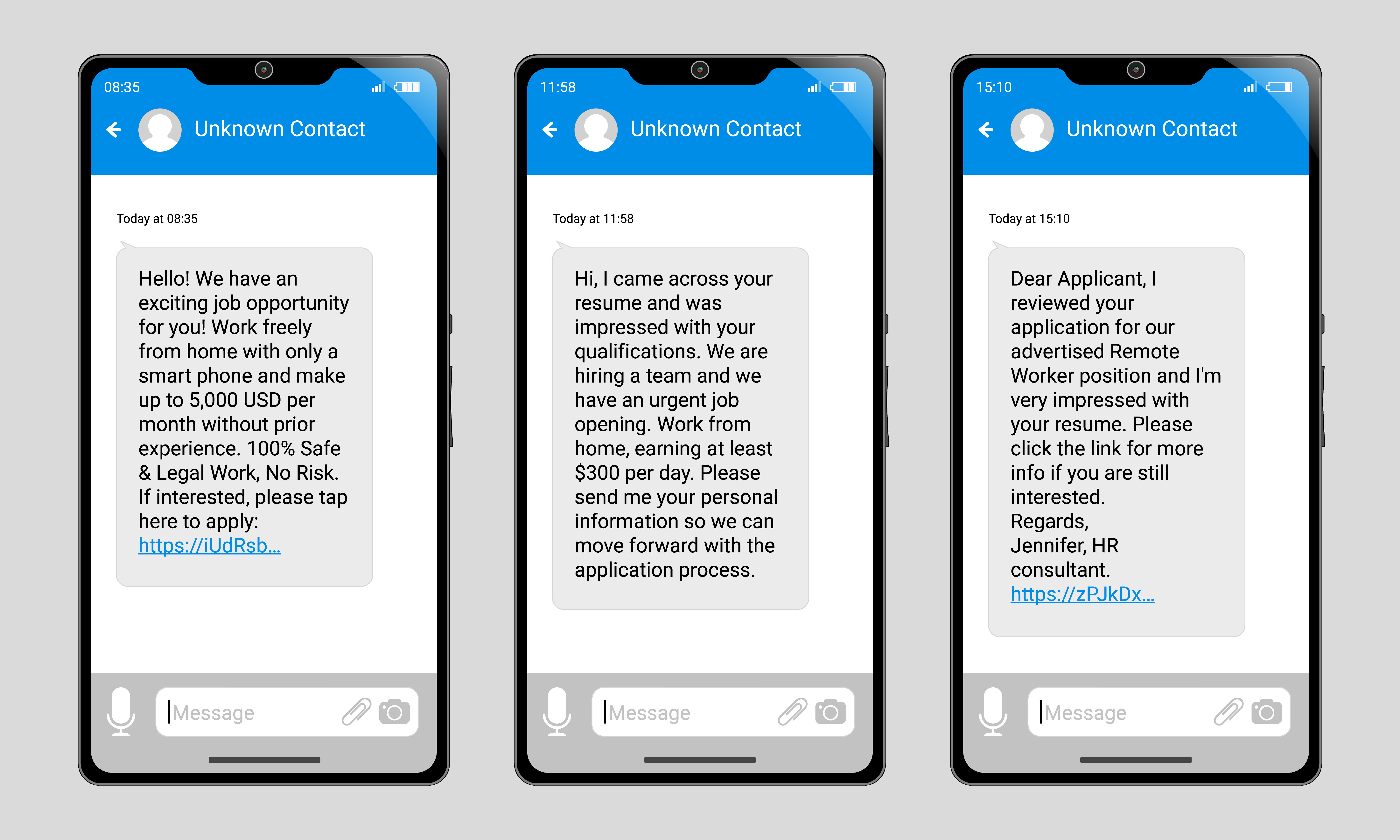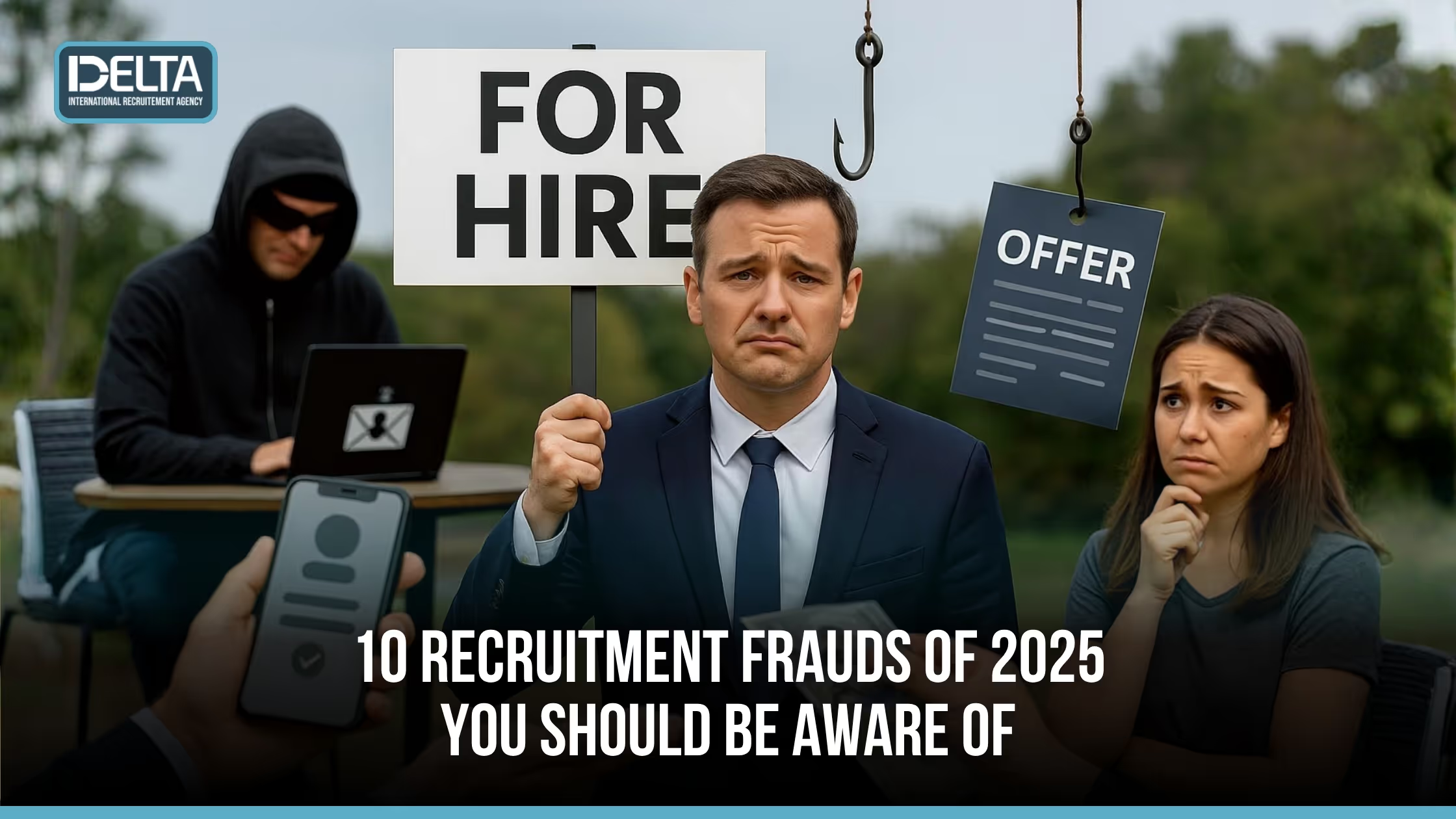According to a recent study, job scams caused $2,742,572 in losses in the first four months of 2025, with a 265% surge since 2021.
This alarming rise means more and more job seekers especially those looking for overseas employment are falling for these scams which steal their money and personal information. Falling victim to a recruitment scam not only causes financial loss but also emotional distress and shattered hopes of a better future.
To protect yourself in this challenging job market, it is essential to recognize the common recruitment frauds of 2025 and understand how to avoid them.
1. Fake Job Offer Scam
Scammers create fake job advertisements promising high salaries and benefits, often requiring payment for "visa processing" or "job placement" upfront. Such offers usually come without official contracts or with vague job details. Never pay money before confirming job authenticity with the official company or embassy. Legitimate overseas agencies like Delta International Recruitment Agency do not ask for fees upfront but help candidates find trusted jobs abroad with verified companies.
2. Upfront Payment Fraud
Fraudulent recruiters demand large sums of money upfront for supposed application fees, training, or documentation services but disappear after payment. Always verify fee transparency and agency credentials, checking reviews and official registrations. Trusted agencies only charge after a candidate secures a confirmed job placement.

3. Work-from-Home Job Scam
Scammers lure applicants with promises of easy remote jobs abroad, often asking for payments for training or equipment. Genuine employers conduct interviews and provide clear job descriptions without upfront costs. Beware of vague offers and confirm company legitimacy through trusted sources.
4. Identity Theft Through False Recruitment
Some scams aim to extract personal identification details such as passports, social security numbers, or bank accounts, under the guise of recruitment, leading to identity theft and misuse. Protect personal data by sharing it only after verifying the recruiter’s authenticity.
5. Phantom Recruitment Agencies
Fake agencies mimic legitimate firms with unprofessional contact details and poor online presence. Always cross-check an agency’s credentials and history. Consider us, we have helped nearly 100k candidates find overseas jobs.
6. Fake Job Interview Scam
Scammers conduct fake interviews to build credibility before extracting money or information. Real employers conduct verifiable interviews, often including video calls with clear recruiters. Always request names and contact info of interviewers and confirm them independently.
7. Overpromise Scam: Too Many Job Openings
A suspiciously large number of similar jobs posted by one recruiter might indicate a scam designed to trap many victims rapidly. Authentic recruiters have realistic job openings aligned with employer needs.
8. Phishing and Fake Domains
Fake recruitment sites resemble legitimate ones to gather your login or payment details. Look for HTTPS, official email contacts, and verify web domains carefully before sharing any information.
9. Job Ads Requiring Social Media Sharing
Scammers ask victims to share fake job ads on their social media to spread a fraudulent scheme and gather more victims. Genuine employers do not require you to advertise jobs to get hired.
10. Data Exploitation and Synthetic Identity Fraud
Recruitment fraud can be a front for collecting data to create synthetic identities for broader fraudulent use. Always be cautious of requests for personal data and report suspicious activity to authorities.
How to Protect Yourself from Recruitment Scams
- Verify job offers only through official company websites or trusted portals.
- Never pay fees before getting a signed contract and valid job confirmation.
- Avoid sharing personal or financial information with unknown recruiters.
- Conduct background research on agencies and recruiters.
- Use an established agency such as Delta International Recruitment Agency, which has strong ties with top companies in the Gulf and globally, assisting nearly 100k candidates safely.
- Report any suspicious recruitment activity to local authorities or fraud prevention offices.
FAQs
How can I spot a fake overseas job offer?
Look for unrealistic promises, vague job descriptions, upfront payment demands, and lack of official documentation or contacts.
Should I ever pay for visa processing or job placement fees?
Legitimate agencies charge these fees only after a confirmed job offer, never upfront.
What if I have already paid a scam recruiter?
Immediately report to your local law enforcement and the fraud reporting agencies. Try to collect all communication records as evidence.
How can Delta International Recruitment Agency help me?
Delta International connects candidates with verified employers overseas, ensuring transparent processes without upfront fees, with a track record of nearly 100k successful placements.
With vigilance and due diligence, job seekers can avoid falling victim to recruitment fraud and find genuine overseas employment opportunities safely.












.webp)
















